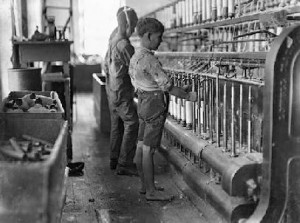Karl Marx, an extremely influential philosopher and revolutionary, was born in 1818 in Germany. He grew up in a middle-class home, and attended the University of Berlin for four years. Marx moved to Paris in 1843, and wrote about his communist views in Economic and Philosophical Manuscripts, which was not published until after his death. In Paris, Marx developed a friendship with Friedrich Engels. The two moved to Brussels, but frequently visited Engels’ family in London, where they joined the Communist League. The two were then asked to write a declaration of the beliefs of the Communist party, leading to the publishing of the Communist Manifesto in 1848. [1]
In The Communist Manifesto, Marx and Engels argue that the bourgeois oppresses the working class. They are interested in getting rid of bourgeois private property. They argue that while the bourgeois are horrified by the thought of getting rid of private property, private property does not exist for nine-tenths of the population. They go on to state, “you must, therefore, confess that by “individual” you mean no other person than the bourgeois.” [2]
The mention of “nine-tenths of the population” leads me to think of current times, and the situation of the 1% of America. While the numbers are not quite the same, the two situations are similar. Many Americans are upset that 1% of the population hold over a quarter of the wealth of the country, while the rest is split up among the other 99% of the population. As Marx and Engels mention, money and wealth can be used as personal or social power.
How else can The Communist Manifesto be applied to current times and problems? Is it too far of a reach to say that The Communist Manifesto can relate to the situation involving the 1% in America?
[1] Steven, Kreis. “Karl Marx, 1818-1883.” The History Guide. January 30, 2008. http://www.historyguide.org/intellect/marx.HTML.
[2] Karl Marx and Frederick Engels, “The Manifesto of the Communist Party,” in The Communist Manifesto and other Revolutionary Writings, ed. Bob Blaisdell (Mineola, New York: Dover Publicans, 2003), 123-150


